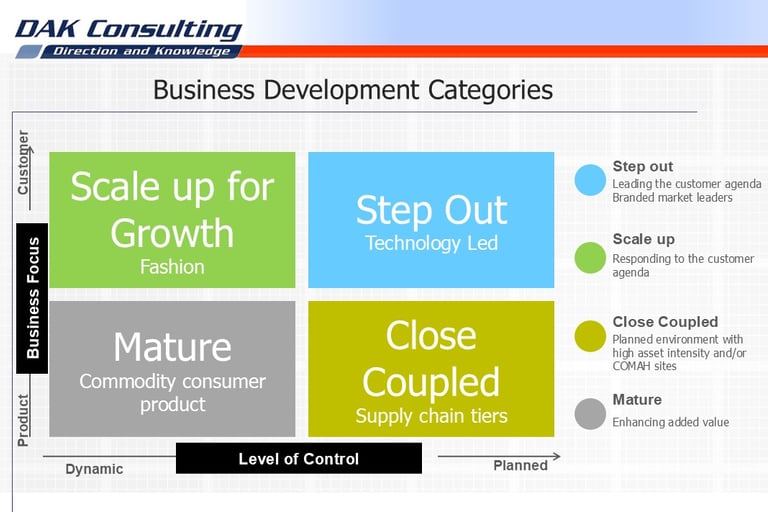A business led approach to improvement
When improvement efforts are aligned with core business goals, they become embedded in daily performance management, rather than existing as parallel initiatives. Without this integration, improvement programmes struggle to deliver long-term value, as their impact on day-to-day management is neither visible nor sustained. Here is how to do that.
3 min read


Although each business has its own unique set of challenges, the business environment dictates the nature of what customers value. For example, manufacturers within the close coupled supply chain that feeds automotive manufacturers have different priorities to those in food and drink. Electronic manufacturers have a different set of issues to deal with than those who supply commodity items or materials.
In today’s fast-paced manufacturing landscape, sustainable improvement must be driven by business priorities—not bolted on as an afterthought. When improvement efforts are aligned with core business goals, they become embedded in daily performance management, rather than existing as parallel initiatives. Without this integration, improvement programmes struggle to deliver long-term value, as their impact on day-to-day management is neither visible nor sustained.
The TPM Excellence programme aligns the improvement roadmap to the nature of your business challenges. That provides a structured, business-led vehicle to connect operational improvement efforts directly to strategic goals—ensuring relevance, traction, and longevity.
The matrix below categorises business environments by the nature of:
Added value offering from product-centric to customer-centric models
Customer relationships—from reactive to planned.
Each category has a different set of business challenges and therefore requires a different set of improvement tactics.


Turning Strategy into Action
Matching the improvement focus with business development strategy provides the vehicle for engaging the workforce with the delivery of business goals. Through that the improvement programme empowers everyone—from the front line to senior leadership:
Cross-functional front-line teams learn to solve problems, prioritise issues, and deliver lasting change
Front-line personnel develop better working practices, building a culture of continuous improvement
Team Leaders are trained to:
Drive focused improvement within their teams
Manage detailed implementation plans
Coach others to maximise engagement and performance
Senior Leaders create the environment needed for sustainable success through active ownership of business improvement goals
Making it Happen
Rather than starting from scratch, the TPM Excellence Programme engages those in these roles in practical improvement projects to identify what’s working, where the gaps lie, and how to unlock rapid, high-impact improvements. The result? A return on investment in months if not weeks.
In addition to delivering improved effectiveness, these practical projects simultaneously develop 3 areas of capability—Leadership, Execution, and Planning—over a Quarterly improvement cadence to connect up daily, weekly, and monthly improvement activities that:
Drive progress along the chosen improvement glide path.
Engage front line teams in systematic improvement.
Provide a framework for project governance and coaching to resolve root causes, capture lessons learned and provide recognition to reinforce cultural development.
It is the development of these capabilities that underpins the continuous cycle of improvement that enhances organisational performance. The text in quotations are statements from executives who have successfully achieved and sustained that improvement cycle over more than 10 years.
Leadership: Oversees delivery of planned goals while capturing lessons learned at each planning horizon. Their role is to provide direction, remove obstacles, and enable the smooth flow of information between teams.
"Managers shift to a coaching role fostering autonomy and problem solving skills."
Execution: Concerns the detailed completion of tasks within each planning horizon, incorporating testing, data analysis, and feedback loops to refine future performance based on real-time insights.
"The recipe for success is 80% mindset 20% tools. Success depends on leadership engagement and employee buy in to a structured progression with maturity gates preventing backsliding."
Planning: Applies lessons learned from execution to adjust tactics, optimise resource allocation, and guide progress along the improvement curve. Effective planning ensures that short-term actions contribute to long-term goals, fostering a culture of continuous improvement.
"Standardisation enables scalability through a common language and approach across all functions."
Final Word
The TPM Excellence Roadmap is more than an improvement initiative—it’s a strategic enabler. It delivers measurable bottom-line results while building the future-ready capabilities your business needs to thrive. By embedding improvement into the fabric of how your organisation operates, you unlock agility, resilience, and lasting competitive advantage.
You don’t have to navigate this transformation alone. Let’s connect and explore how we can work together to realise the full potential of your operations.
Mature e.g. Commodity products: Build leadership depth and capability to raise customer added value. Establish basic operating conditions and standardise core tasks to enhance resilience and customer service offerings.
Close coupled e.g. Automotive supply chain: Drive cost competitiveness, Reduce total cost of ownership for the customer
Optimise plant operations, reduce both planned and unplanned intervention, and move towards no-touch production
Scale up e.g. Fashion: Build a strong brand through product and service excellence to boost margins, Enhance operational flexibility, resilience, and consistency in quality and innovation.
Step out: e.g. Technology led: Partner with customers and channels to push technical boundaries and shape the customer agenda
Customise product and service offerings and improve adaptability to set customer agenda.
DAK Consulting
UK
Info@dakconsulting.co.uk
www.dakacademy.com
